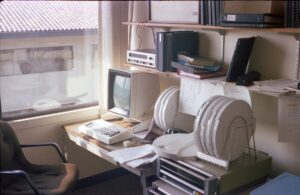
It’s been almost a year since I posted to this blog, but I haven’t been completely inactive. This week, as part of its Software Gems: The Computer History Museum Historical Source Code Series, the Computer History Museum released a set of files archived in the 1970s and early 1980s from the Xerox Alto file servers at Xerox PARC. The files include source code, executables, documents, fonts, and other files.
This release has been a long time in the making. The files were originally archived to 9-track magnetic tape, but around 1991 they were transferred to 8mm tape cartridges. Around 2003, before he joined the Computer History Museum, Al Kossow, working under a Nondisclosure Agreement with PARC, transferred the 8mm tapes to DVDs, and sifted through the entire archive looking for files specifically related to the Alto — the archive had included files from many other projects over several decades. After many years of discussion, and the involvement of a number of people inside and outside of PARC, an agreement with CHM was finally signed in February 2011, and a CD with the Alto files that Al had located was given to CHM.
In August of 2013, I asked Len Shustek what had become of the files, and he suggested I write a blog post about them. So I talked to Al (now CHM software curator), who gave me a copy of the files. It turns out they were images of the tape records written by a Cedar Mesa program called the Archivist. Luckily, when the 9-track tapes were transferred to 8mm tapes, a file called rosetta.tar containing the Archivist source code plus some documentation was included on each tape. Once I obtained a copy of rosetta.tar I was able to write a program that “dearchived” the tape records, recreating a set of file directories. To make the files easier to view over the web, I added code to create a static web site allowing the files to be browsed, including translations from Bravo format to HTML and Press format to PDF. (Bravo was the first WYSIWYG word processor, and Press was a device-independent print-file format.)
There are 14680 files in all, of which 8598 are distinct. They include the Alto operating system; BCPL, Mesa, and (portions of the) Smalltalk programming environments; applications such as Bravo, Draw, and the Laurel email client; fonts and printing software (PARC had the first laser printers); and server software (including the IFS file server and the Grapevine distributed mail and name server).
Although not many people ever used an Alto, it had a huge influence on the hardware and software we use today, so I am very pleased that this software is now available for study.
The blog post Len invited me to write is here. The archive itself is here, but I recommend starting with this walk-through of the archive describing what is there and who wrote the various programs. More detail about the archive (provenance, naming conventions, file types, etc.) is available here.
Update 2023/05/10: Corrected link.

Do you have any information on Avie Tevanian’s Defender game for the Alto? I played it too much my freshman year at CMU, in 1983-1984. It was beautifully done.
Unfortunately I do not have any information about that game.
Is the software for converting PRESS files to PDF available somewhere? I am sifting through some MIT Lisp Machine related where there are I a bunch of such files which would be nice to make viewable.
Yes, the PRESS to PDF functionality is part of the program restore_alto_files that I used to unpack the archive tape and create the web site. At the end of the “walkthrough” page (http://xeroxalto.computerhistory.org/xerox_alto_file_system_archive.html) there is a link to this program: http://xeroxalto.computerhistory.org/src/restore_alto_files.tar.gz . To convert a single file, you’d run it as:
./restore_alto_files –press=path_to_press_file/foo.press
and it would write foo.press.ps to the same directory (a PostScript file).
I’ve only compiled it on MacOS, so I don’t know if there will be problems on other platforms. If you’ll send me a couple of your Lisp Machine .press files, I will take a first crack at converting them.
Quick peek at the restore_alto_files tells me that it would take a some porting to get it working on non-MacOS; though not that much work.
But even given that, I realized that I cannot get those PRESS files (easily!) since the current system software didn’t have the needed hardcopy facilities. And on top of that, after some code spelunking it also only works on PLT files, and not the SUDS DRW files which are the ones that I’m actually interested in. One step forward, two steps backwards.
I suppose you don’t know anyone who is sitting on a copy of SUDS, or could take a bunch of SUDS files and convert them into something usable?
Sorry, I don’t know anyone who could do that.